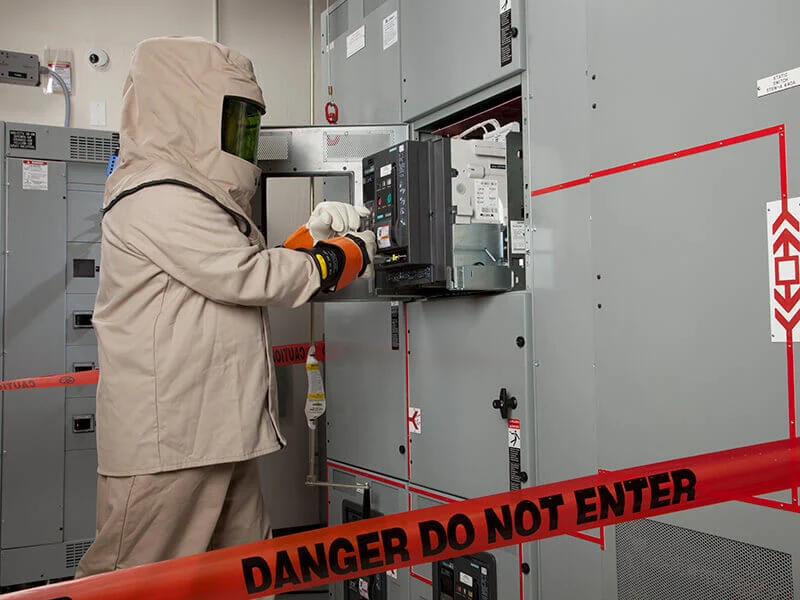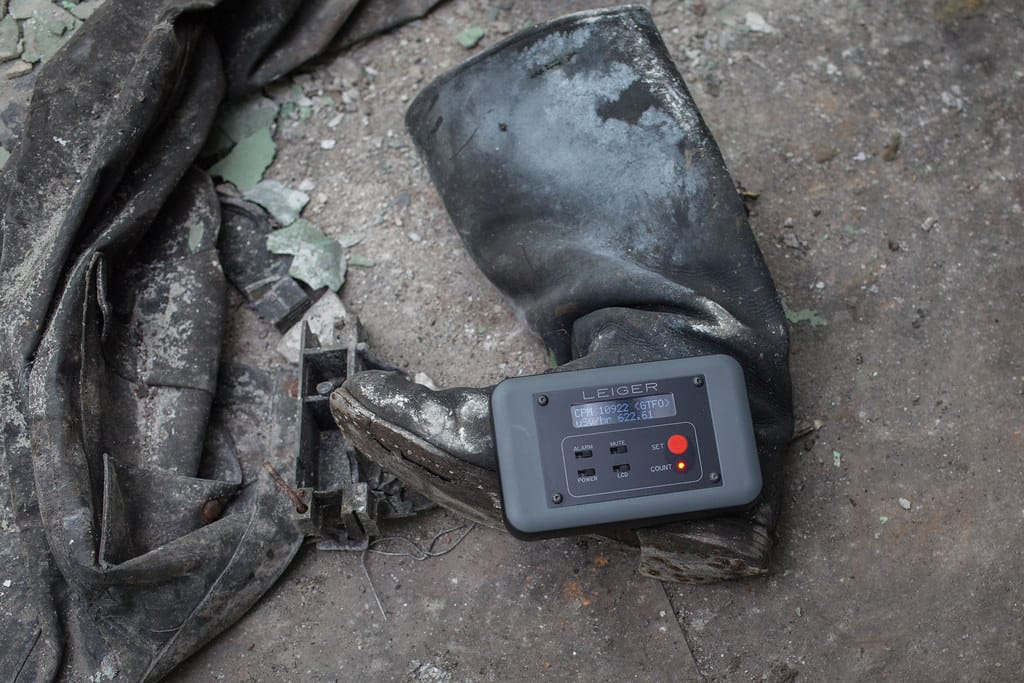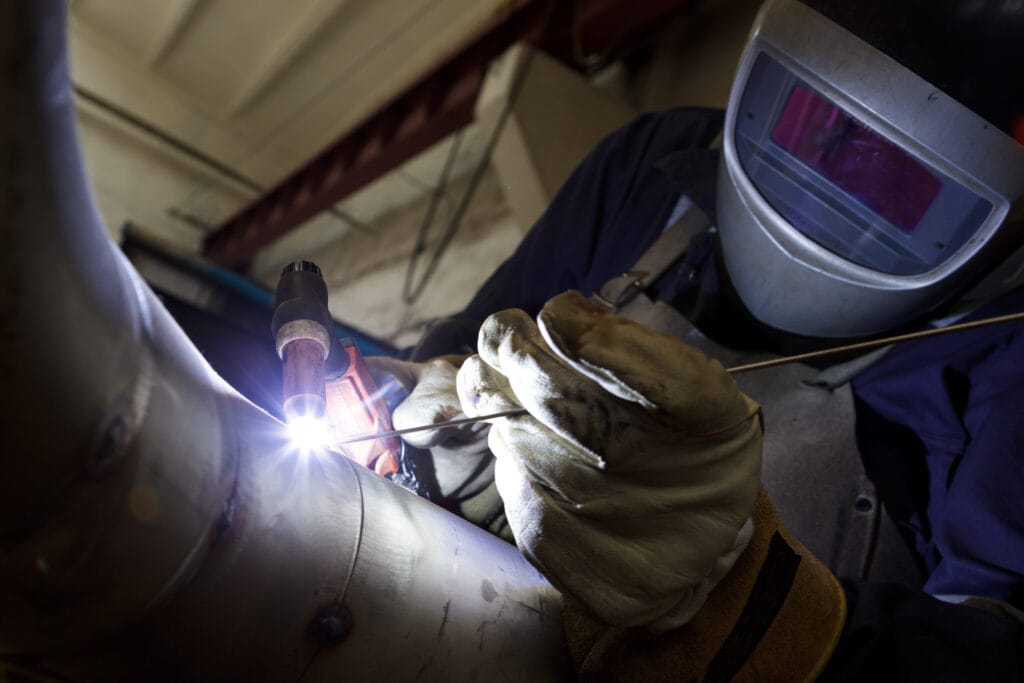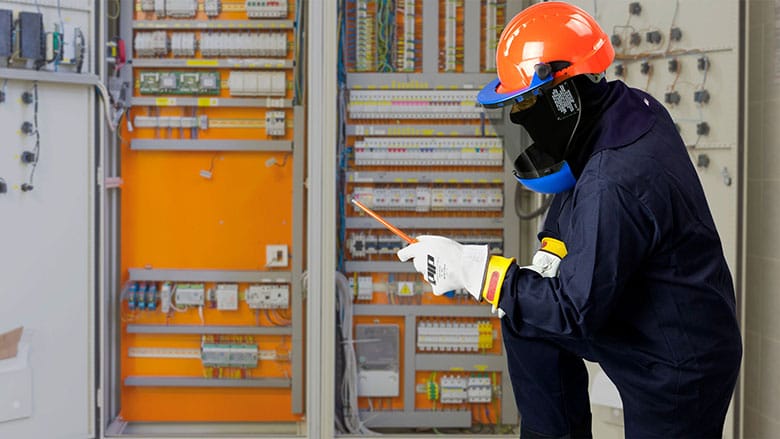
Arc flash injuries are often associated with burns and electrical shock—but what many people overlook is the intense sound generated during an arc event. In a fraction of a second, a blast can exceed 140 decibels (dB)—louder than a shotgun or a jet engine at takeoff.
That’s loud enough to rupture eardrums, cause permanent hearing loss, and disorient the worker. In some cases, it’s the sound—not the heat—that causes the first injury.
If you’re building a complete arc flash PPE program, don’t skip this crucial component: Hearing Protection Equipment (HPE).
Why Arc Flashes Can Cause Hearing Damage (Decibels Explained)
Arc flashes are not silent. When the arc strikes, it creates a powerful shockwave that produces intense noise—often in excess of 140 to 160 dB. By comparison:
| Sound Source | Approximate dB Level |
|---|---|
| Normal conversation | 60 dB |
| Power tools (saws, drills) | 90–100 dB |
| Jet engine at 30 meters | 130 dB |
| Arc flash explosion | 140–165 dB |
| Pain threshold | 120 dB |
According to OSHA, exposure to any sound above 120 dB can cause immediate damage. Arc flash noise can cause:
- Instant permanent hearing loss
- Tinnitus (ringing in the ears)
- Disorientation, reducing ability to react or escape
- Startle response, potentially leading to falls or dropped tools
Even if a worker survives the arc, hearing loss can be a life-changing consequence.
Types of Hearing Protection: Earplugs vs. Earmuffs
The good news is, hearing protection is affordable, lightweight, and easy to implement—but you must select the right type based on your work environment and PPE system.
🔹 Earplugs
- Inserted into the ear canal
- Lightweight and easy to carry
- Can be disposable (foam) or reusable (silicone)
- May be difficult to use with gloves
🔹 Earmuffs
- Worn over the ears
- Provide more consistent fit and higher attenuation
- Easy to use with other PPE
- Heavier, may cause discomfort over long shifts
🔹 Dual Protection
In high-noise arc environments, dual protection is recommended:
Earplugs + Earmuffs = Additive Noise Reduction (NRR)
✅ Always verify the compatibility of hearing protection with arc flash hoods, hard hats, and face shields.
How to Select Arc-Safe Hearing Protection
Not all hearing protection is suitable for arc flash environments. PPE must provide noise protection without introducing arc ignition risks.
What to look for:
- Dielectric earmuffs (no exposed metal parts)
- Non-conductive headbands
- Certified ANSI S3.19 or EN 352 rated products
- High NRR (Noise Reduction Rating)—typically 25–33 dB
- Compatibility with arc flash hoods and helmets
⚠️ Avoid earmuffs with metal bands or components—they can conduct electricity during an arc.
✅ Tip: Many top-tier arc flash hoods now include built-in hearing protection or earmuff mount points.
Noise Reduction Ratings (NRR) and How to Interpret Them
NRR (Noise Reduction Rating) is the key spec for hearing protection. It’s measured in decibels (dB) and reflects how much sound the device can block under ideal conditions.
| Protection Type | Typical NRR Range | Notes |
|---|---|---|
| Foam Earplugs | 29–33 dB | Highest rating, but fit-dependent |
| Silicone Earplugs | 20–28 dB | Durable, reusable |
| Earmuffs | 23–30 dB | Easy to apply, reusable |
| Dual Protection | Up to 36–40 dB* | *Add 5 dB to highest-rated method |
To estimate actual protection:
(NRR – 7) ÷ 2 = estimated dB reduction in real use
Example:
A 30 dB earplug ≈ 11.5 dB of real-world protection.
✅ Combine NRR with user comfort—a high-rated device that no one wears won’t help anyone.
Compatibility with Hoods and Arc Flash PPE Systems
Hearing protection must integrate smoothly with the rest of your arc flash PPE to provide complete coverage without interference.
Key points to consider:
- Can earmuffs fit under or over the arc flash hood?
- Are earplugs easy to insert while wearing gloves?
- Is hearing protection ventilated enough to prevent overheating inside a full hood?
- Does the system maintain seal integrity around ears and jawline?
If your team wears full arc flash hoods (CAT 3–4), it’s important to test hearing protection for real-world usability—not just rating on paper.
Usage Guidelines in High-Noise + High-Voltage Settings
Even in non-arc environments, electrical workplaces are often loud: generators, transformers, air compressors, grinders—all add up.
Best practices for hearing protection:
- Require HPE in any area over 85 dB
- Provide training on insertion and fit
- Inspect reusable earplugs or muffs before every use
- Store clean and dry in a sealed case
- Replace foam plugs daily; earmuffs as needed when cushions wear out
Some companies color-code earplugs by shift or crew to avoid cross-contamination.
✅ Offer multiple types to employees—fit and comfort vary by person. The more options, the higher the compliance.
Conclusion
Hearing protection may not be the first thing that comes to mind when we talk about arc flash—but it should be. The pressure wave and sound of an arc event can leave lasting, invisible injuries that are completely preventable.
When selecting hearing protection for your team:
- Choose non-conductive, arc-compatible products
- Look for high NRR values and standards like ANSI S3.19
- Ensure it works with your existing hoods, helmets, and gloves
- Train workers to use, inspect, and replace gear regularly
Need help sourcing reliable, arc-safe hearing protection as part of a full PPE solution? Let’s find the right setup for your voltage level and work environment.
📩 Contact: [email protected]
🌐 Visit: www.workwearsolutions.net
Zion Zhang
Recent Posts
 How to Conduct an Arc Flash Risk Assessment Before Selecting PPE2025年6月24日Buying arc flash PPE without a proper risk assessment is […]
How to Conduct an Arc Flash Risk Assessment Before Selecting PPE2025年6月24日Buying arc flash PPE without a proper risk assessment is […] Arc Flash PPE Kits: Complete Protection in One Package2025年6月24日Building an arc flash PPE program from scratch can feel […]
Arc Flash PPE Kits: Complete Protection in One Package2025年6月24日Building an arc flash PPE program from scratch can feel […] EH-Rated Safety Boots for Arc Flash Environments2025年6月24日In arc flash zones, every part of the body needs […]
EH-Rated Safety Boots for Arc Flash Environments2025年6月24日In arc flash zones, every part of the body needs […] Arc-Rated Outerwear: Jackets, Coats, and Rainwear for Extreme Conditions2025年6月24日Electrical safety doesn’t stop when the weather turns cold […]
Arc-Rated Outerwear: Jackets, Coats, and Rainwear for Extreme Conditions2025年6月24日Electrical safety doesn’t stop when the weather turns cold […] Voltage-Rated Gloves: Insulating Hands from Deadly Contact2025年6月24日Your hands are your most valuable tools—and in electrical […]
Voltage-Rated Gloves: Insulating Hands from Deadly Contact2025年6月24日Your hands are your most valuable tools—and in electrical […] Arc Flash Hoods and Face Shields: Full Protection for the Head and Face2025年6月24日In arc flash environments, protecting the head and face […]
Arc Flash Hoods and Face Shields: Full Protection for the Head and Face2025年6月24日In arc flash environments, protecting the head and face […]
CONTACT US
- Feel free to contact us any time. We will get back to you as soon as we can!
- +86-17330061805
